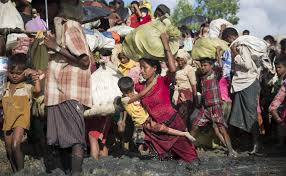Myanmarese Rohingya refugees have filed a $150 billion lawsuit against Meta Platforms Inc, formerly known as Facebook, alleging that the social media firm failed to take action against anti-Rohingya hate speech that contributed to violence.
The company’s failures to control material and the platform’s design, according to a class-action lawsuit filed in California on Monday by law firms Edelson PC and Fields PLLC, contributed to real-world violence endured by the Rohingya population.
British lawyers also sent a letter of notice to Facebook’s London office as part of a coordinated operation.
Request for comment on the complaint was not immediately returned by Facebook. After the Feb. 1 coup, the business admitted that it was “too slow to combat disinformation and hate” in Myanmar, but that it has already taken actions to address platform abuses in the country, including barring the military from Facebook and Instagram.
Facebook claims that a US internet legislation known as Section 230 protects it from accountability for content uploaded by users. Section 230 states that online platforms are not accountable for content submitted by third parties. If Section 230 is claimed as a defense, the complainant claims it will apply Myanmar law to the accusations.
Although U.S. courts can apply foreign law to cases involving alleged harms and company activity in other countries, two legal experts interviewed by reporters said they were unaware of a successful precedent for foreign law being used in lawsuits against social media companies where Section 230 protections might apply.
Invoking Myanmar law, according to Anupam Chander, a professor at Georgetown University Law Center, was not “inappropriate.” “It’s unlikely to succeed,” he said, adding that “it would be extraordinary for Congress to have foreclosed proceedings under US law.”
After a military crackdown that included mass executions and rape, more than 730,000 Rohingya Muslims fled Myanmar’s Rakhine state in August 2017. Civilians have been killed and villages have been burned, according to human rights organizations.
Myanmar’s government claims to be fighting an insurgency and denies committing systematic killings.
A spokeswoman for the Myanmar junta did not return a call seeking comment on the legal action against Facebook.
Human rights investigators from the United Nations concluded in 2018 that the usage of Facebook had a crucial part in the transmission of hate speech that fueled the violence. More than 1,000 examples of postings, comments, and photographs insulting the Rohingya and other Muslims on Facebook were identified, according to an investigation that year, which was included in the US case.
An investigation into allegations of crimes in the region has been initiated by the International Criminal Court. A federal judge in the United States ordered Facebook to release records of accounts linked to anti-Rohingya violence in Myanmar that the social media giant had closed down in September.
The latest class-action lawsuit is based on assertions made by Facebook whistleblower Frances Haugen, who revealed a cache of internal documents earlier this year that the corporation fails to control offensive content in nations where it is most likely to do harm.
The complaint also references recent media stories, alleging that Myanmar’s military was engaging in “information warfare” by creating bogus social media profiles.
Mohammed Taher, a Rohingya refugee residing in the enormous Bangladesh camps that house over a million people, said anti-Rohingya misinformation was extensively shared on Facebook. “We appreciate the move,” he stated over the phone.

















